Chapter 7 Review: Emotional Messages in Communication, INC271
VerifiedAdded on 2022/02/04
|10
|2481
|53
Report
AI Summary
This report, prepared for the Faculty of Communication & Media Studies' Diploma in Communication and Media (INC271), reviews Chapter 7 on Emotional Messages. The report analyzes the principles of emotions and emotional expression, including their influence by culture, gender, and personality. It identifies obstacles to effective emotional communication, such as societal and cultural customs, fear, and inadequate interpersonal skills. The report then delves into strategies for expressing and responding to emotions competently, including specific communication techniques like using 'I-messages,' handling anger, and supporting those in grief. It emphasizes the importance of self-awareness, specific language, and taking responsibility for one's feelings. The report concludes by highlighting the significance of empathy and nonverbal cues in understanding and connecting with others emotionally.

1
FACULTY OF COMMUNICATION & MEDIA STUDIES DIPLOMA IN
COMMUNICATION AND MEDIA
INC271 – Chapter Review
Chapter 7: Emotional Messages
PREPARED BY:
MMC1103A
LECTURER:
null
DATE OF SUBMISSION:
30/6/2021
FACULTY OF COMMUNICATION & MEDIA STUDIES DIPLOMA IN
COMMUNICATION AND MEDIA
INC271 – Chapter Review
Chapter 7: Emotional Messages
PREPARED BY:
MMC1103A
LECTURER:
null
DATE OF SUBMISSION:
30/6/2021
Paraphrase This Document
Need a fresh take? Get an instant paraphrase of this document with our AI Paraphraser

2
Table of Contents
Question A............................................................................................................................ 3
Question B......................................................................................................................... 4-5
Question C......................................................................................................................... 5-9
References........................................................................................................................ 10
Table of Contents
Question A............................................................................................................................ 3
Question B......................................................................................................................... 4-5
Question C......................................................................................................................... 5-9
References........................................................................................................................ 10
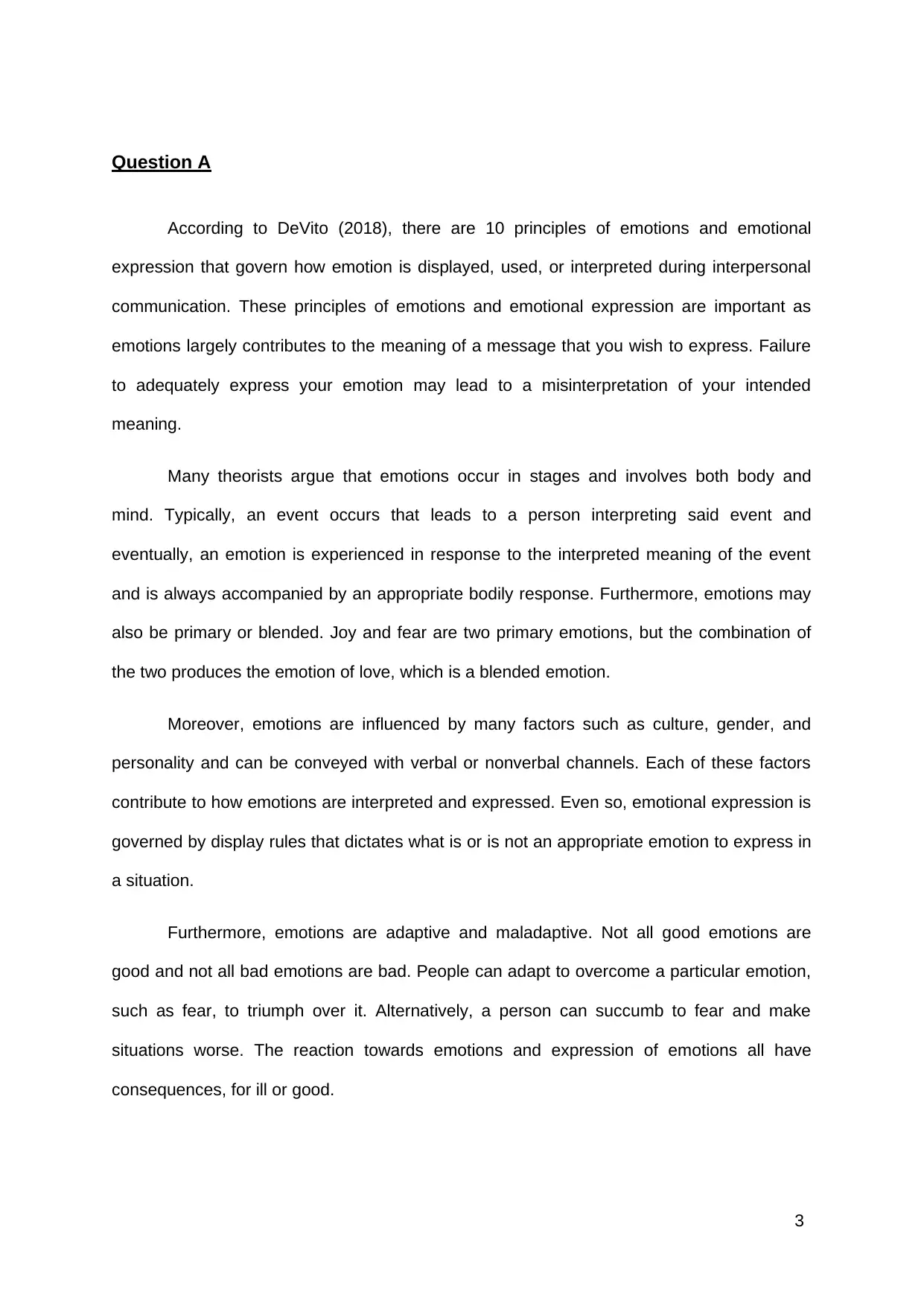
3
Question A
According to DeVito (2018), there are 10 principles of emotions and emotional
expression that govern how emotion is displayed, used, or interpreted during interpersonal
communication. These principles of emotions and emotional expression are important as
emotions largely contributes to the meaning of a message that you wish to express. Failure
to adequately express your emotion may lead to a misinterpretation of your intended
meaning.
Many theorists argue that emotions occur in stages and involves both body and
mind. Typically, an event occurs that leads to a person interpreting said event and
eventually, an emotion is experienced in response to the interpreted meaning of the event
and is always accompanied by an appropriate bodily response. Furthermore, emotions may
also be primary or blended. Joy and fear are two primary emotions, but the combination of
the two produces the emotion of love, which is a blended emotion.
Moreover, emotions are influenced by many factors such as culture, gender, and
personality and can be conveyed with verbal or nonverbal channels. Each of these factors
contribute to how emotions are interpreted and expressed. Even so, emotional expression is
governed by display rules that dictates what is or is not an appropriate emotion to express in
a situation.
Furthermore, emotions are adaptive and maladaptive. Not all good emotions are
good and not all bad emotions are bad. People can adapt to overcome a particular emotion,
such as fear, to triumph over it. Alternatively, a person can succumb to fear and make
situations worse. The reaction towards emotions and expression of emotions all have
consequences, for ill or good.
Question A
According to DeVito (2018), there are 10 principles of emotions and emotional
expression that govern how emotion is displayed, used, or interpreted during interpersonal
communication. These principles of emotions and emotional expression are important as
emotions largely contributes to the meaning of a message that you wish to express. Failure
to adequately express your emotion may lead to a misinterpretation of your intended
meaning.
Many theorists argue that emotions occur in stages and involves both body and
mind. Typically, an event occurs that leads to a person interpreting said event and
eventually, an emotion is experienced in response to the interpreted meaning of the event
and is always accompanied by an appropriate bodily response. Furthermore, emotions may
also be primary or blended. Joy and fear are two primary emotions, but the combination of
the two produces the emotion of love, which is a blended emotion.
Moreover, emotions are influenced by many factors such as culture, gender, and
personality and can be conveyed with verbal or nonverbal channels. Each of these factors
contribute to how emotions are interpreted and expressed. Even so, emotional expression is
governed by display rules that dictates what is or is not an appropriate emotion to express in
a situation.
Furthermore, emotions are adaptive and maladaptive. Not all good emotions are
good and not all bad emotions are bad. People can adapt to overcome a particular emotion,
such as fear, to triumph over it. Alternatively, a person can succumb to fear and make
situations worse. The reaction towards emotions and expression of emotions all have
consequences, for ill or good.
⊘ This is a preview!⊘
Do you want full access?
Subscribe today to unlock all pages.

Trusted by 1+ million students worldwide
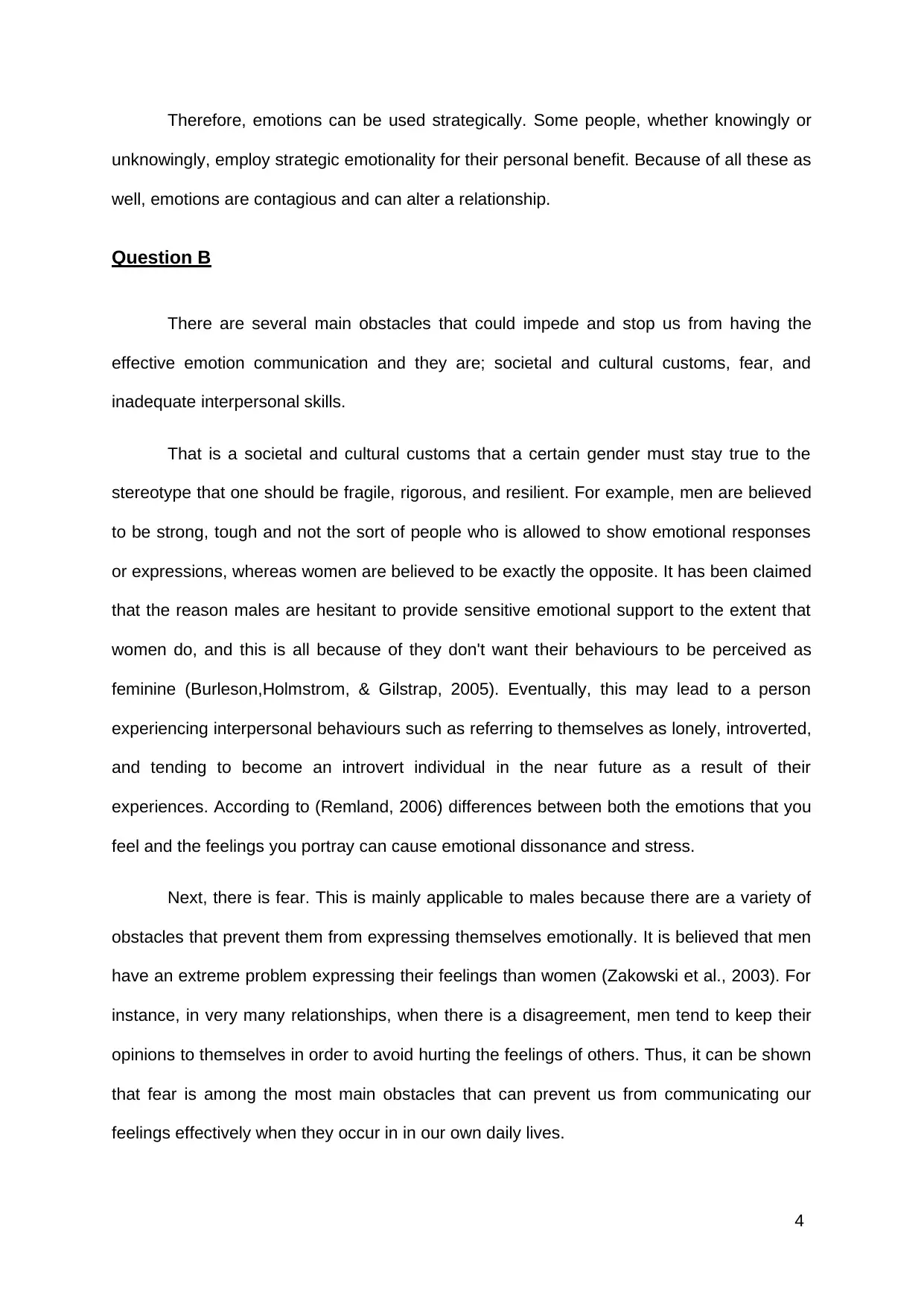
4
Therefore, emotions can be used strategically. Some people, whether knowingly or
unknowingly, employ strategic emotionality for their personal benefit. Because of all these as
well, emotions are contagious and can alter a relationship.
Question B
There are several main obstacles that could impede and stop us from having the
effective emotion communication and they are; societal and cultural customs, fear, and
inadequate interpersonal skills.
That is a societal and cultural customs that a certain gender must stay true to the
stereotype that one should be fragile, rigorous, and resilient. For example, men are believed
to be strong, tough and not the sort of people who is allowed to show emotional responses
or expressions, whereas women are believed to be exactly the opposite. It has been claimed
that the reason males are hesitant to provide sensitive emotional support to the extent that
women do, and this is all because of they don't want their behaviours to be perceived as
feminine (Burleson,Holmstrom, & Gilstrap, 2005). Eventually, this may lead to a person
experiencing interpersonal behaviours such as referring to themselves as lonely, introverted,
and tending to become an introvert individual in the near future as a result of their
experiences. According to (Remland, 2006) differences between both the emotions that you
feel and the feelings you portray can cause emotional dissonance and stress.
Next, there is fear. This is mainly applicable to males because there are a variety of
obstacles that prevent them from expressing themselves emotionally. It is believed that men
have an extreme problem expressing their feelings than women (Zakowski et al., 2003). For
instance, in very many relationships, when there is a disagreement, men tend to keep their
opinions to themselves in order to avoid hurting the feelings of others. Thus, it can be shown
that fear is among the most main obstacles that can prevent us from communicating our
feelings effectively when they occur in in our own daily lives.
Therefore, emotions can be used strategically. Some people, whether knowingly or
unknowingly, employ strategic emotionality for their personal benefit. Because of all these as
well, emotions are contagious and can alter a relationship.
Question B
There are several main obstacles that could impede and stop us from having the
effective emotion communication and they are; societal and cultural customs, fear, and
inadequate interpersonal skills.
That is a societal and cultural customs that a certain gender must stay true to the
stereotype that one should be fragile, rigorous, and resilient. For example, men are believed
to be strong, tough and not the sort of people who is allowed to show emotional responses
or expressions, whereas women are believed to be exactly the opposite. It has been claimed
that the reason males are hesitant to provide sensitive emotional support to the extent that
women do, and this is all because of they don't want their behaviours to be perceived as
feminine (Burleson,Holmstrom, & Gilstrap, 2005). Eventually, this may lead to a person
experiencing interpersonal behaviours such as referring to themselves as lonely, introverted,
and tending to become an introvert individual in the near future as a result of their
experiences. According to (Remland, 2006) differences between both the emotions that you
feel and the feelings you portray can cause emotional dissonance and stress.
Next, there is fear. This is mainly applicable to males because there are a variety of
obstacles that prevent them from expressing themselves emotionally. It is believed that men
have an extreme problem expressing their feelings than women (Zakowski et al., 2003). For
instance, in very many relationships, when there is a disagreement, men tend to keep their
opinions to themselves in order to avoid hurting the feelings of others. Thus, it can be shown
that fear is among the most main obstacles that can prevent us from communicating our
feelings effectively when they occur in in our own daily lives.
Paraphrase This Document
Need a fresh take? Get an instant paraphrase of this document with our AI Paraphraser
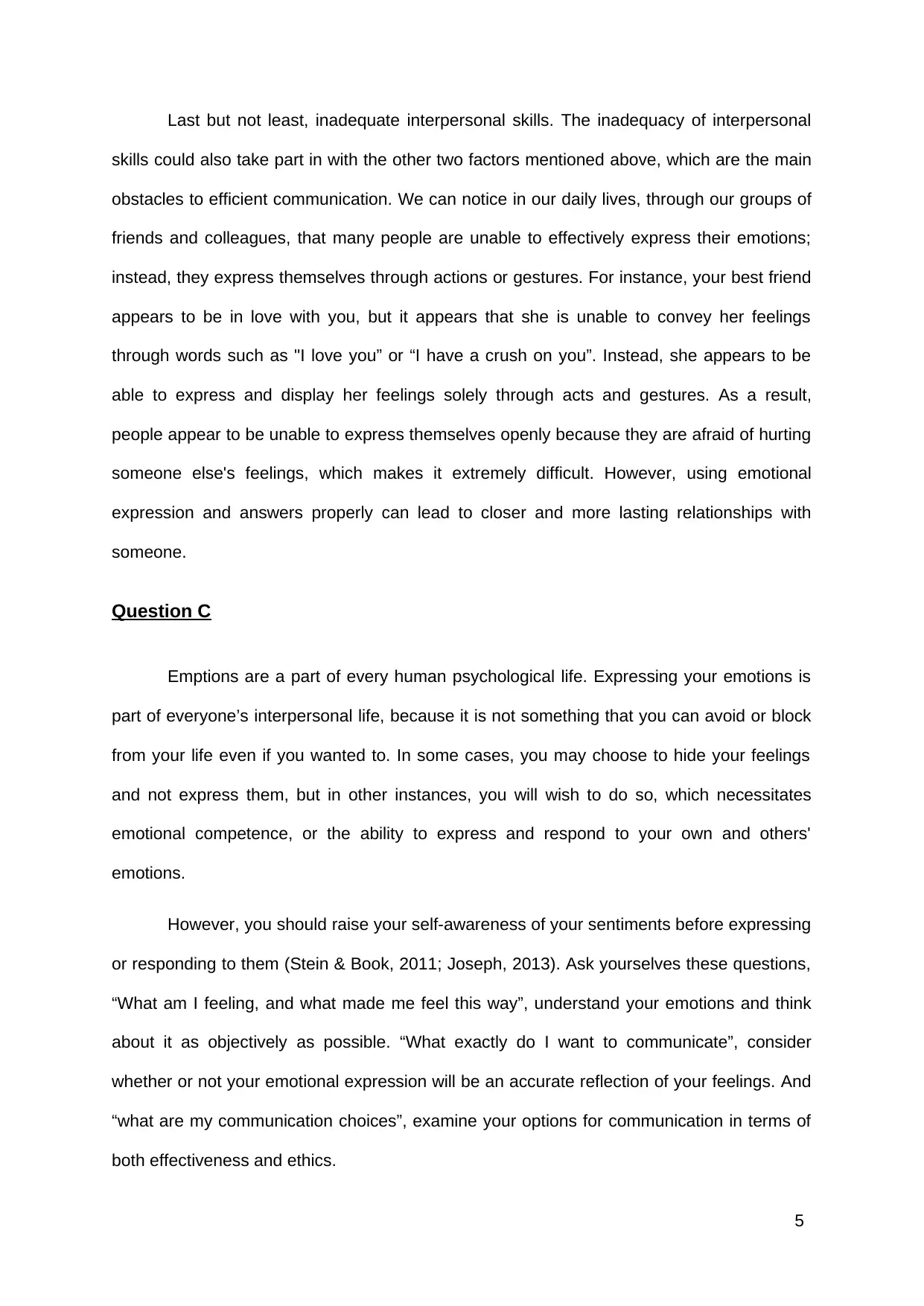
5
Last but not least, inadequate interpersonal skills. The inadequacy of interpersonal
skills could also take part in with the other two factors mentioned above, which are the main
obstacles to efficient communication. We can notice in our daily lives, through our groups of
friends and colleagues, that many people are unable to effectively express their emotions;
instead, they express themselves through actions or gestures. For instance, your best friend
appears to be in love with you, but it appears that she is unable to convey her feelings
through words such as "I love you” or “I have a crush on you”. Instead, she appears to be
able to express and display her feelings solely through acts and gestures. As a result,
people appear to be unable to express themselves openly because they are afraid of hurting
someone else's feelings, which makes it extremely difficult. However, using emotional
expression and answers properly can lead to closer and more lasting relationships with
someone.
Question C
Emptions are a part of every human psychological life. Expressing your emotions is
part of everyone’s interpersonal life, because it is not something that you can avoid or block
from your life even if you wanted to. In some cases, you may choose to hide your feelings
and not express them, but in other instances, you will wish to do so, which necessitates
emotional competence, or the ability to express and respond to your own and others'
emotions.
However, you should raise your self-awareness of your sentiments before expressing
or responding to them (Stein & Book, 2011; Joseph, 2013). Ask yourselves these questions,
“What am I feeling, and what made me feel this way”, understand your emotions and think
about it as objectively as possible. “What exactly do I want to communicate”, consider
whether or not your emotional expression will be an accurate reflection of your feelings. And
“what are my communication choices”, examine your options for communication in terms of
both effectiveness and ethics.
Last but not least, inadequate interpersonal skills. The inadequacy of interpersonal
skills could also take part in with the other two factors mentioned above, which are the main
obstacles to efficient communication. We can notice in our daily lives, through our groups of
friends and colleagues, that many people are unable to effectively express their emotions;
instead, they express themselves through actions or gestures. For instance, your best friend
appears to be in love with you, but it appears that she is unable to convey her feelings
through words such as "I love you” or “I have a crush on you”. Instead, she appears to be
able to express and display her feelings solely through acts and gestures. As a result,
people appear to be unable to express themselves openly because they are afraid of hurting
someone else's feelings, which makes it extremely difficult. However, using emotional
expression and answers properly can lead to closer and more lasting relationships with
someone.
Question C
Emptions are a part of every human psychological life. Expressing your emotions is
part of everyone’s interpersonal life, because it is not something that you can avoid or block
from your life even if you wanted to. In some cases, you may choose to hide your feelings
and not express them, but in other instances, you will wish to do so, which necessitates
emotional competence, or the ability to express and respond to your own and others'
emotions.
However, you should raise your self-awareness of your sentiments before expressing
or responding to them (Stein & Book, 2011; Joseph, 2013). Ask yourselves these questions,
“What am I feeling, and what made me feel this way”, understand your emotions and think
about it as objectively as possible. “What exactly do I want to communicate”, consider
whether or not your emotional expression will be an accurate reflection of your feelings. And
“what are my communication choices”, examine your options for communication in terms of
both effectiveness and ethics.
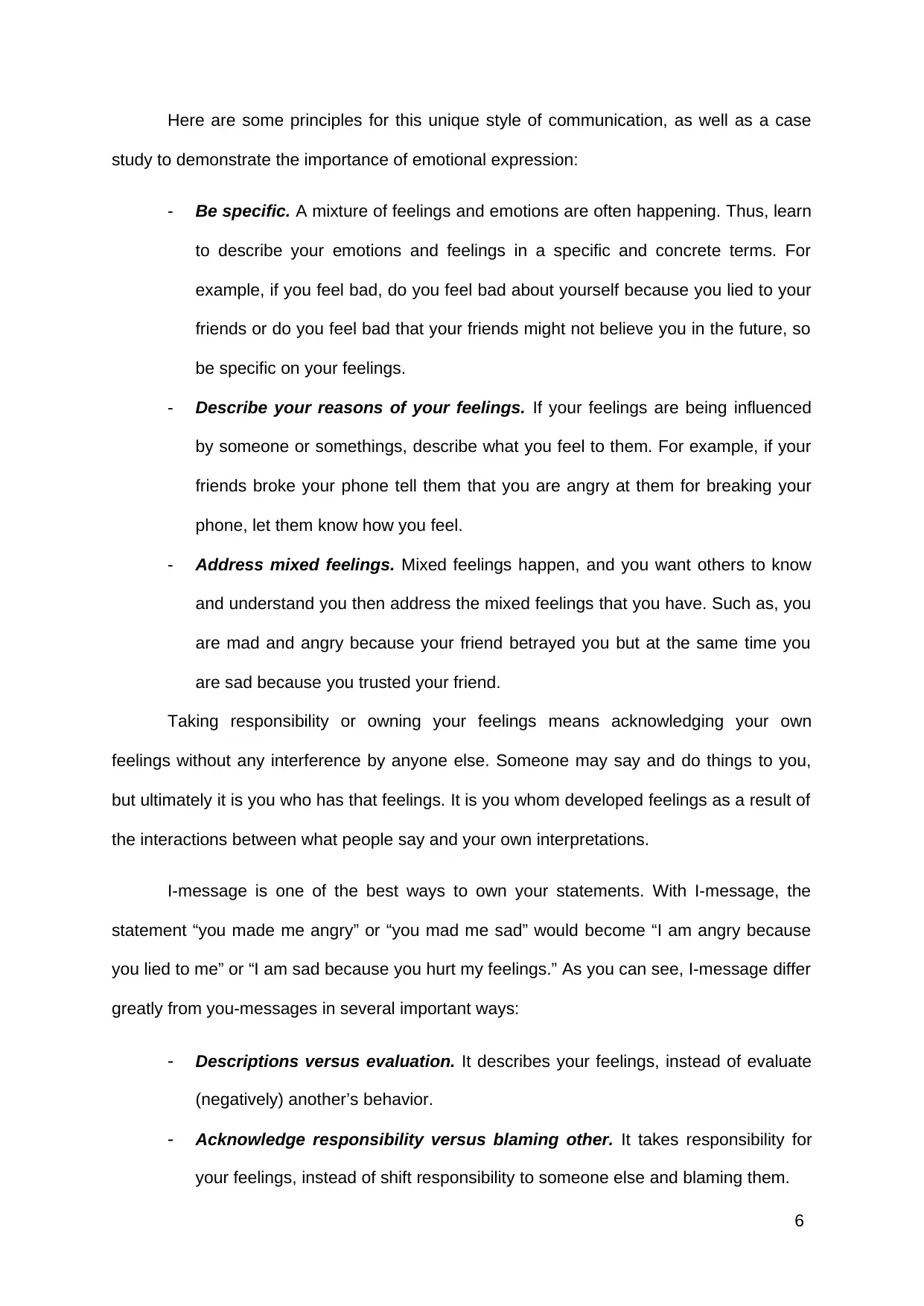
6
Here are some principles for this unique style of communication, as well as a case
study to demonstrate the importance of emotional expression:
- Be specific. A mixture of feelings and emotions are often happening. Thus, learn
to describe your emotions and feelings in a specific and concrete terms. For
example, if you feel bad, do you feel bad about yourself because you lied to your
friends or do you feel bad that your friends might not believe you in the future, so
be specific on your feelings.
- Describe your reasons of your feelings. If your feelings are being influenced
by someone or somethings, describe what you feel to them. For example, if your
friends broke your phone tell them that you are angry at them for breaking your
phone, let them know how you feel.
- Address mixed feelings. Mixed feelings happen, and you want others to know
and understand you then address the mixed feelings that you have. Such as, you
are mad and angry because your friend betrayed you but at the same time you
are sad because you trusted your friend.
Taking responsibility or owning your feelings means acknowledging your own
feelings without any interference by anyone else. Someone may say and do things to you,
but ultimately it is you who has that feelings. It is you whom developed feelings as a result of
the interactions between what people say and your own interpretations.
I-message is one of the best ways to own your statements. With I-message, the
statement “you made me angry” or “you mad me sad” would become “I am angry because
you lied to me” or “I am sad because you hurt my feelings.” As you can see, I-message differ
greatly from you-messages in several important ways:
- Descriptions versus evaluation. It describes your feelings, instead of evaluate
(negatively) another’s behavior.
- Acknowledge responsibility versus blaming other. It takes responsibility for
your feelings, instead of shift responsibility to someone else and blaming them.
Here are some principles for this unique style of communication, as well as a case
study to demonstrate the importance of emotional expression:
- Be specific. A mixture of feelings and emotions are often happening. Thus, learn
to describe your emotions and feelings in a specific and concrete terms. For
example, if you feel bad, do you feel bad about yourself because you lied to your
friends or do you feel bad that your friends might not believe you in the future, so
be specific on your feelings.
- Describe your reasons of your feelings. If your feelings are being influenced
by someone or somethings, describe what you feel to them. For example, if your
friends broke your phone tell them that you are angry at them for breaking your
phone, let them know how you feel.
- Address mixed feelings. Mixed feelings happen, and you want others to know
and understand you then address the mixed feelings that you have. Such as, you
are mad and angry because your friend betrayed you but at the same time you
are sad because you trusted your friend.
Taking responsibility or owning your feelings means acknowledging your own
feelings without any interference by anyone else. Someone may say and do things to you,
but ultimately it is you who has that feelings. It is you whom developed feelings as a result of
the interactions between what people say and your own interpretations.
I-message is one of the best ways to own your statements. With I-message, the
statement “you made me angry” or “you mad me sad” would become “I am angry because
you lied to me” or “I am sad because you hurt my feelings.” As you can see, I-message differ
greatly from you-messages in several important ways:
- Descriptions versus evaluation. It describes your feelings, instead of evaluate
(negatively) another’s behavior.
- Acknowledge responsibility versus blaming other. It takes responsibility for
your feelings, instead of shift responsibility to someone else and blaming them.
⊘ This is a preview!⊘
Do you want full access?
Subscribe today to unlock all pages.

Trusted by 1+ million students worldwide
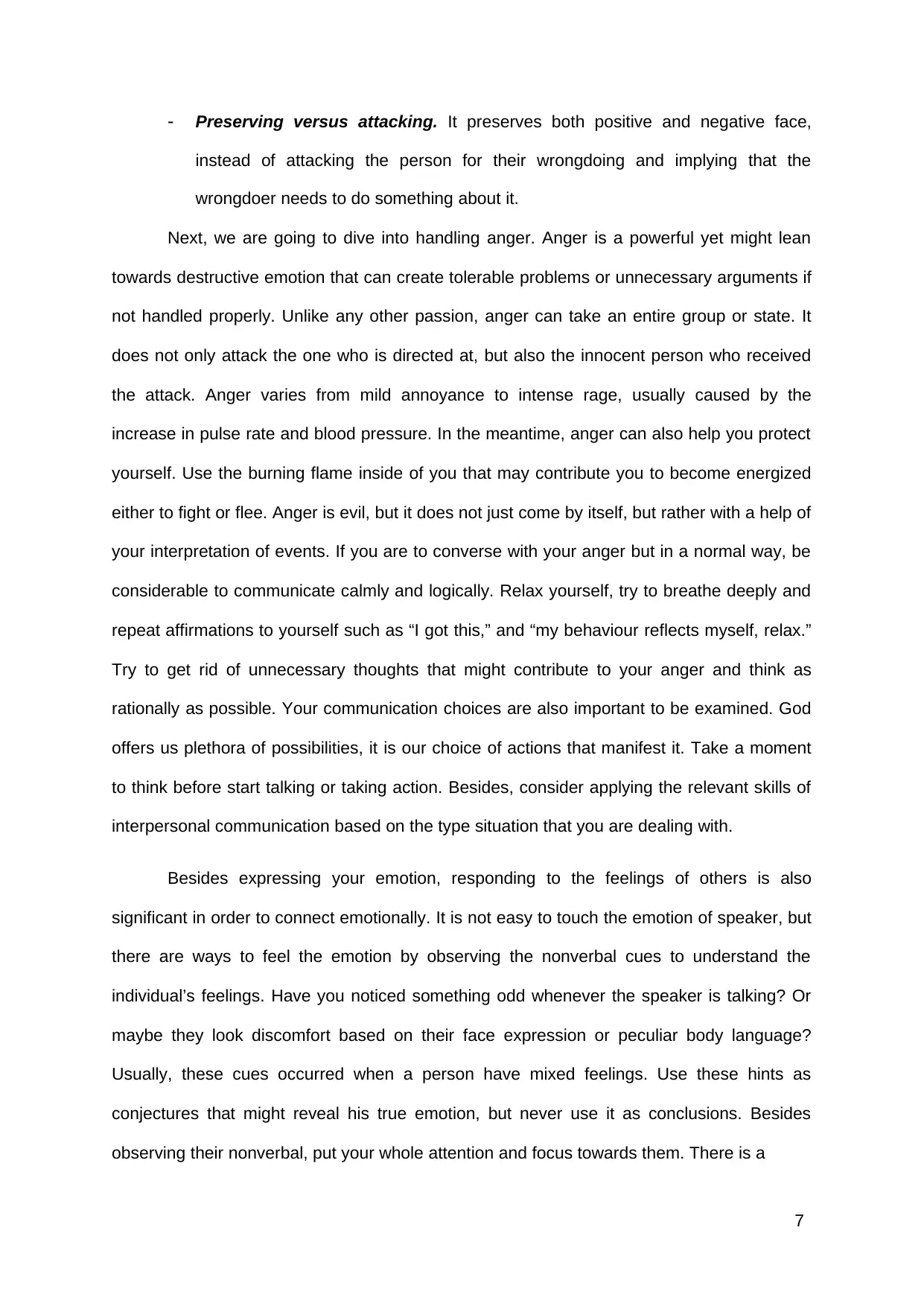
7
- Preserving versus attacking. It preserves both positive and negative face,
instead of attacking the person for their wrongdoing and implying that the
wrongdoer needs to do something about it.
Next, we are going to dive into handling anger. Anger is a powerful yet might lean
towards destructive emotion that can create tolerable problems or unnecessary arguments if
not handled properly. Unlike any other passion, anger can take an entire group or state. It
does not only attack the one who is directed at, but also the innocent person who received
the attack. Anger varies from mild annoyance to intense rage, usually caused by the
increase in pulse rate and blood pressure. In the meantime, anger can also help you protect
yourself. Use the burning flame inside of you that may contribute you to become energized
either to fight or flee. Anger is evil, but it does not just come by itself, but rather with a help of
your interpretation of events. If you are to converse with your anger but in a normal way, be
considerable to communicate calmly and logically. Relax yourself, try to breathe deeply and
repeat affirmations to yourself such as “I got this,” and “my behaviour reflects myself, relax.”
Try to get rid of unnecessary thoughts that might contribute to your anger and think as
rationally as possible. Your communication choices are also important to be examined. God
offers us plethora of possibilities, it is our choice of actions that manifest it. Take a moment
to think before start talking or taking action. Besides, consider applying the relevant skills of
interpersonal communication based on the type situation that you are dealing with.
Besides expressing your emotion, responding to the feelings of others is also
significant in order to connect emotionally. It is not easy to touch the emotion of speaker, but
there are ways to feel the emotion by observing the nonverbal cues to understand the
individual’s feelings. Have you noticed something odd whenever the speaker is talking? Or
maybe they look discomfort based on their face expression or peculiar body language?
Usually, these cues occurred when a person have mixed feelings. Use these hints as
conjectures that might reveal his true emotion, but never use it as conclusions. Besides
observing their nonverbal, put your whole attention and focus towards them. There is a
- Preserving versus attacking. It preserves both positive and negative face,
instead of attacking the person for their wrongdoing and implying that the
wrongdoer needs to do something about it.
Next, we are going to dive into handling anger. Anger is a powerful yet might lean
towards destructive emotion that can create tolerable problems or unnecessary arguments if
not handled properly. Unlike any other passion, anger can take an entire group or state. It
does not only attack the one who is directed at, but also the innocent person who received
the attack. Anger varies from mild annoyance to intense rage, usually caused by the
increase in pulse rate and blood pressure. In the meantime, anger can also help you protect
yourself. Use the burning flame inside of you that may contribute you to become energized
either to fight or flee. Anger is evil, but it does not just come by itself, but rather with a help of
your interpretation of events. If you are to converse with your anger but in a normal way, be
considerable to communicate calmly and logically. Relax yourself, try to breathe deeply and
repeat affirmations to yourself such as “I got this,” and “my behaviour reflects myself, relax.”
Try to get rid of unnecessary thoughts that might contribute to your anger and think as
rationally as possible. Your communication choices are also important to be examined. God
offers us plethora of possibilities, it is our choice of actions that manifest it. Take a moment
to think before start talking or taking action. Besides, consider applying the relevant skills of
interpersonal communication based on the type situation that you are dealing with.
Besides expressing your emotion, responding to the feelings of others is also
significant in order to connect emotionally. It is not easy to touch the emotion of speaker, but
there are ways to feel the emotion by observing the nonverbal cues to understand the
individual’s feelings. Have you noticed something odd whenever the speaker is talking? Or
maybe they look discomfort based on their face expression or peculiar body language?
Usually, these cues occurred when a person have mixed feelings. Use these hints as
conjectures that might reveal his true emotion, but never use it as conclusions. Besides
observing their nonverbal, put your whole attention and focus towards them. There is a
Paraphrase This Document
Need a fresh take? Get an instant paraphrase of this document with our AI Paraphraser
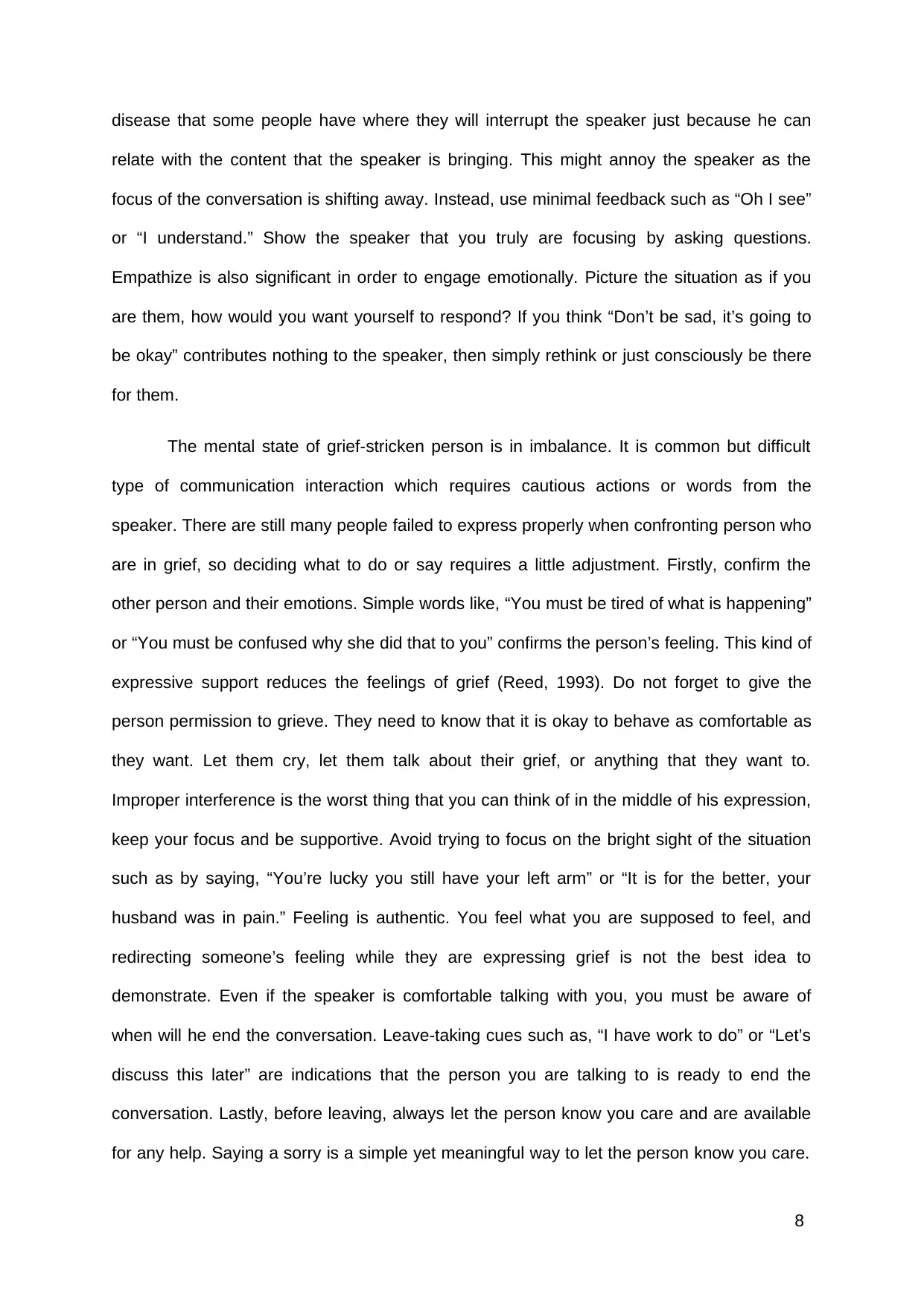
8
disease that some people have where they will interrupt the speaker just because he can
relate with the content that the speaker is bringing. This might annoy the speaker as the
focus of the conversation is shifting away. Instead, use minimal feedback such as “Oh I see”
or “I understand.” Show the speaker that you truly are focusing by asking questions.
Empathize is also significant in order to engage emotionally. Picture the situation as if you
are them, how would you want yourself to respond? If you think “Don’t be sad, it’s going to
be okay” contributes nothing to the speaker, then simply rethink or just consciously be there
for them.
The mental state of grief-stricken person is in imbalance. It is common but difficult
type of communication interaction which requires cautious actions or words from the
speaker. There are still many people failed to express properly when confronting person who
are in grief, so deciding what to do or say requires a little adjustment. Firstly, confirm the
other person and their emotions. Simple words like, “You must be tired of what is happening”
or “You must be confused why she did that to you” confirms the person’s feeling. This kind of
expressive support reduces the feelings of grief (Reed, 1993). Do not forget to give the
person permission to grieve. They need to know that it is okay to behave as comfortable as
they want. Let them cry, let them talk about their grief, or anything that they want to.
Improper interference is the worst thing that you can think of in the middle of his expression,
keep your focus and be supportive. Avoid trying to focus on the bright sight of the situation
such as by saying, “You’re lucky you still have your left arm” or “It is for the better, your
husband was in pain.” Feeling is authentic. You feel what you are supposed to feel, and
redirecting someone’s feeling while they are expressing grief is not the best idea to
demonstrate. Even if the speaker is comfortable talking with you, you must be aware of
when will he end the conversation. Leave-taking cues such as, “I have work to do” or “Let’s
discuss this later” are indications that the person you are talking to is ready to end the
conversation. Lastly, before leaving, always let the person know you care and are available
for any help. Saying a sorry is a simple yet meaningful way to let the person know you care.
disease that some people have where they will interrupt the speaker just because he can
relate with the content that the speaker is bringing. This might annoy the speaker as the
focus of the conversation is shifting away. Instead, use minimal feedback such as “Oh I see”
or “I understand.” Show the speaker that you truly are focusing by asking questions.
Empathize is also significant in order to engage emotionally. Picture the situation as if you
are them, how would you want yourself to respond? If you think “Don’t be sad, it’s going to
be okay” contributes nothing to the speaker, then simply rethink or just consciously be there
for them.
The mental state of grief-stricken person is in imbalance. It is common but difficult
type of communication interaction which requires cautious actions or words from the
speaker. There are still many people failed to express properly when confronting person who
are in grief, so deciding what to do or say requires a little adjustment. Firstly, confirm the
other person and their emotions. Simple words like, “You must be tired of what is happening”
or “You must be confused why she did that to you” confirms the person’s feeling. This kind of
expressive support reduces the feelings of grief (Reed, 1993). Do not forget to give the
person permission to grieve. They need to know that it is okay to behave as comfortable as
they want. Let them cry, let them talk about their grief, or anything that they want to.
Improper interference is the worst thing that you can think of in the middle of his expression,
keep your focus and be supportive. Avoid trying to focus on the bright sight of the situation
such as by saying, “You’re lucky you still have your left arm” or “It is for the better, your
husband was in pain.” Feeling is authentic. You feel what you are supposed to feel, and
redirecting someone’s feeling while they are expressing grief is not the best idea to
demonstrate. Even if the speaker is comfortable talking with you, you must be aware of
when will he end the conversation. Leave-taking cues such as, “I have work to do” or “Let’s
discuss this later” are indications that the person you are talking to is ready to end the
conversation. Lastly, before leaving, always let the person know you care and are available
for any help. Saying a sorry is a simple yet meaningful way to let the person know you care.

9
Convey your empathy so that the person knows that you can feel to some extent what they
are going through.
Convey your empathy so that the person knows that you can feel to some extent what they
are going through.
⊘ This is a preview!⊘
Do you want full access?
Subscribe today to unlock all pages.

Trusted by 1+ million students worldwide

10
References
DeVito, J. A. (2018). The interpersonal communication book (15th ed.). Harlow, United
Kingdom : Pearson Education Limited, 2018.
Saarni, C. (2000). Emotional competence: A developmental perspective.
Seneca, L. A. (45 C.E.). On Anger. Independently published.
References
DeVito, J. A. (2018). The interpersonal communication book (15th ed.). Harlow, United
Kingdom : Pearson Education Limited, 2018.
Saarni, C. (2000). Emotional competence: A developmental perspective.
Seneca, L. A. (45 C.E.). On Anger. Independently published.
1 out of 10
Related Documents
Your All-in-One AI-Powered Toolkit for Academic Success.
+13062052269
info@desklib.com
Available 24*7 on WhatsApp / Email
![[object Object]](/_next/static/media/star-bottom.7253800d.svg)
Unlock your academic potential
Copyright © 2020–2025 A2Z Services. All Rights Reserved. Developed and managed by ZUCOL.



